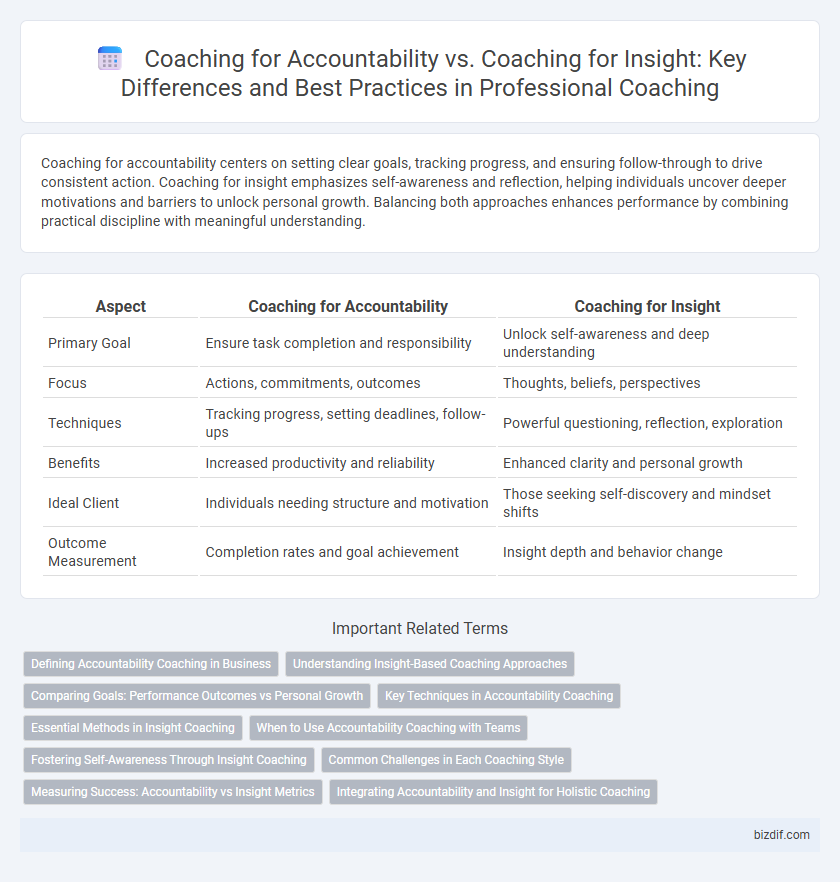Coaching for accountability centers on setting clear goals, tracking progress, and ensuring follow-through to drive consistent action. Coaching for insight emphasizes self-awareness and reflection, helping individuals uncover deeper motivations and barriers to unlock personal growth. Balancing both approaches enhances performance by combining practical discipline with meaningful understanding.
Table of Comparison
| Aspect | Coaching for Accountability | Coaching for Insight |
|---|---|---|
| Primary Goal | Ensure task completion and responsibility | Unlock self-awareness and deep understanding |
| Focus | Actions, commitments, outcomes | Thoughts, beliefs, perspectives |
| Techniques | Tracking progress, setting deadlines, follow-ups | Powerful questioning, reflection, exploration |
| Benefits | Increased productivity and reliability | Enhanced clarity and personal growth |
| Ideal Client | Individuals needing structure and motivation | Those seeking self-discovery and mindset shifts |
| Outcome Measurement | Completion rates and goal achievement | Insight depth and behavior change |
Defining Accountability Coaching in Business
Accountability coaching in business centers on setting clear expectations and measurable goals to drive consistent performance and responsibility. This approach ensures employees and leaders remain answerable for their actions and outcomes, enhancing productivity and organizational alignment. By integrating regular check-ins and structured feedback, accountability coaching fosters commitment and sustained progress toward strategic objectives.
Understanding Insight-Based Coaching Approaches
Insight-based coaching emphasizes deep self-awareness and cognitive shifts to empower clients in identifying underlying motivations and barriers, fostering sustainable behavior change. This approach contrasts with accountability coaching, which primarily focuses on tracking commitments and external performance metrics. By prioritizing internal insight over external compliance, insight-based coaching cultivates intrinsic motivation and long-term personal growth.
Comparing Goals: Performance Outcomes vs Personal Growth
Coaching for accountability emphasizes clear performance outcomes such as meeting specific targets, deadlines, and measurable results to drive organizational success. In contrast, coaching for insight prioritizes personal growth by fostering self-awareness, emotional intelligence, and long-term development beyond immediate metrics. Both approaches serve distinct goals: accountability coaching aligns behaviors with external expectations, while insight coaching cultivates internal motivation and lasting change.
Key Techniques in Accountability Coaching
Key techniques in accountability coaching include setting clear, measurable goals and establishing regular progress check-ins to maintain momentum and commitment. Utilizing tools such as performance tracking and feedback loops helps clients stay accountable while reinforcing responsibility for actions. Emphasizing behavioral commitments and action plans distinguishes accountability coaching by driving tangible results through consistent follow-through.
Essential Methods in Insight Coaching
Insight coaching emphasizes powerful questioning, reflective listening, and fostering self-awareness to unlock clients' intrinsic motivations and clarity. Essential methods include Socratic dialogue, mindfulness techniques, and narrative reframing, which help clients gain deeper understanding and generate actionable solutions. This approach contrasts with accountability coaching by prioritizing internal insight over external goal monitoring.
When to Use Accountability Coaching with Teams
Accountability coaching with teams is essential when clear performance metrics and deadlines drive success, ensuring team members consistently meet agreed-upon goals and responsibilities. This coaching approach enhances commitment, fosters transparency, and aligns individual actions with organizational objectives during project execution or process improvements. Use accountability coaching when teams need structured support to maintain discipline and follow-through without diverting focus from daily tasks.
Fostering Self-Awareness Through Insight Coaching
Insight coaching deepens self-awareness by encouraging clients to reflect on their thoughts, emotions, and behaviors, enabling a clearer understanding of underlying motivations. This approach promotes intrinsic growth rather than external pressure, fostering long-term personal development and authentic change. Emphasizing mindfulness and emotional intelligence, insight coaching helps individuals align actions with core values for sustained effectiveness.
Common Challenges in Each Coaching Style
Coaching for accountability often faces challenges such as resistance to commitment and difficulty in tracking measurable progress, which can hinder consistent follow-through. Coaching for insight frequently encounters obstacles like client reluctance to self-reflect deeply and ambiguity in defining clear action steps from newfound awareness. Both styles require tailored strategies to address these distinct hurdles, enhancing effectiveness in fostering growth and development.
Measuring Success: Accountability vs Insight Metrics
Coaching for accountability prioritizes success metrics such as goal completion rates, adherence to deadlines, and behavioral consistency, offering concrete, trackable data to gauge progress. Coaching for insight measures success through qualitative metrics like self-awareness improvements, emotional intelligence growth, and the depth of reflection, focusing on long-term personal development. Both approaches require distinct evaluation tools, with accountability relying on performance indicators and insight emphasizing transformational learning outcomes.
Integrating Accountability and Insight for Holistic Coaching
Integrating accountability and insight in coaching enhances client development by combining measurable progress with deep self-awareness, driving sustained behavioral change. Accountability frameworks ensure clear goal-setting and responsibility, while insight-oriented coaching fosters reflection and emotional intelligence, leading to informed decision-making. This holistic approach enables coaches to tailor interventions that balance external performance metrics with internal motivations for optimal growth outcomes.
Coaching for accountability vs coaching for insight Infographic

 bizdif.com
bizdif.com